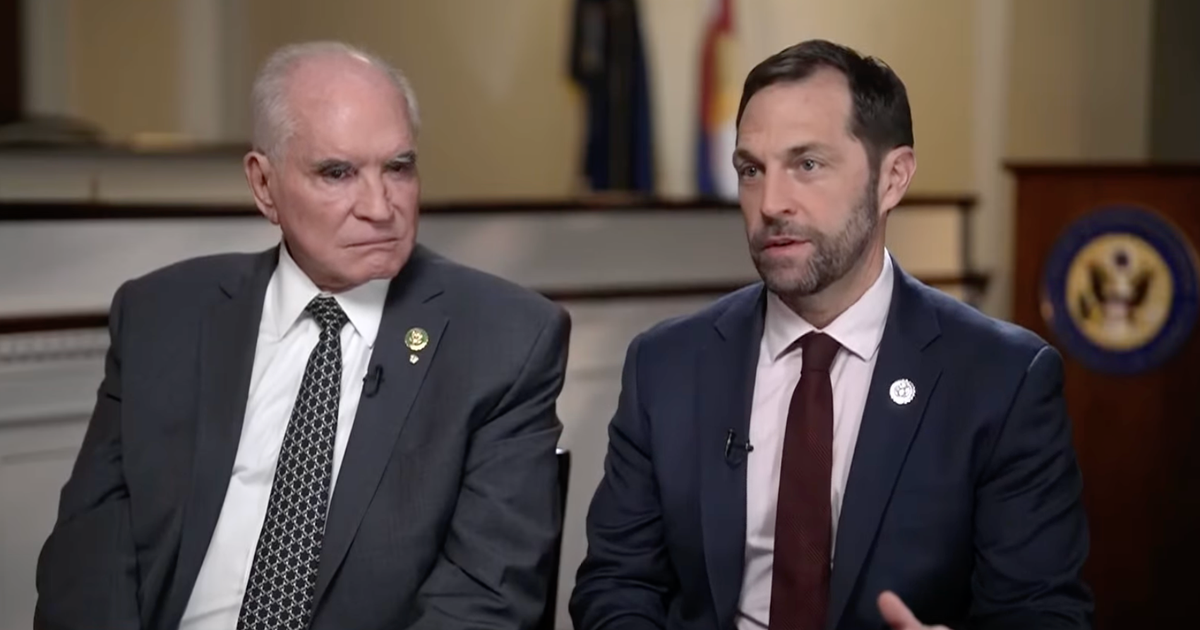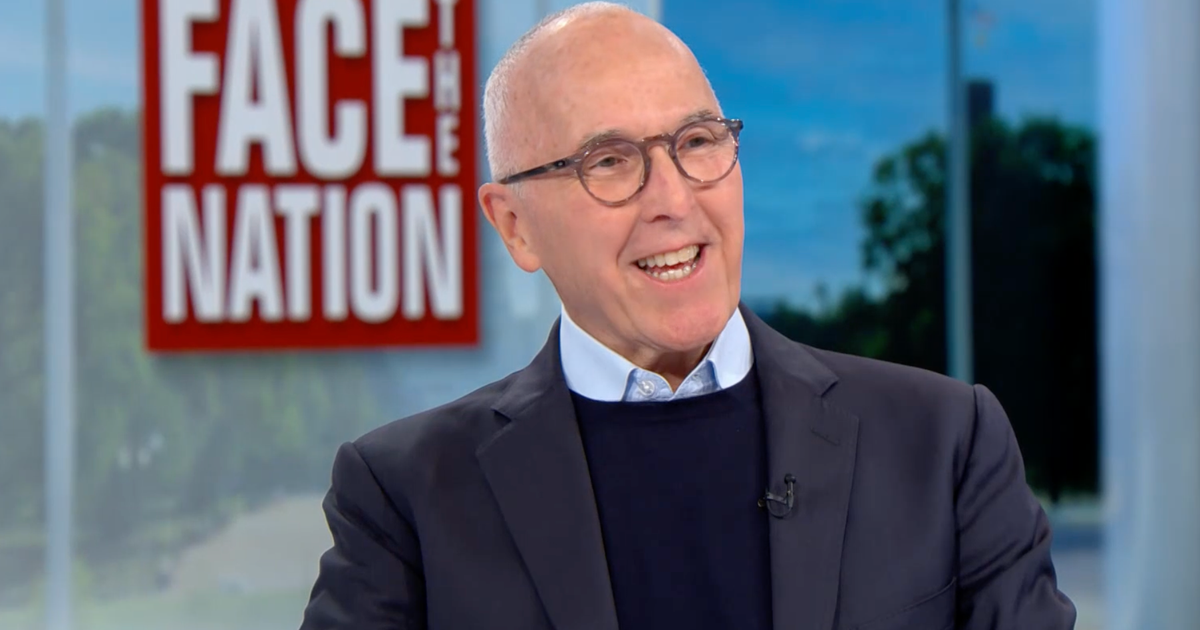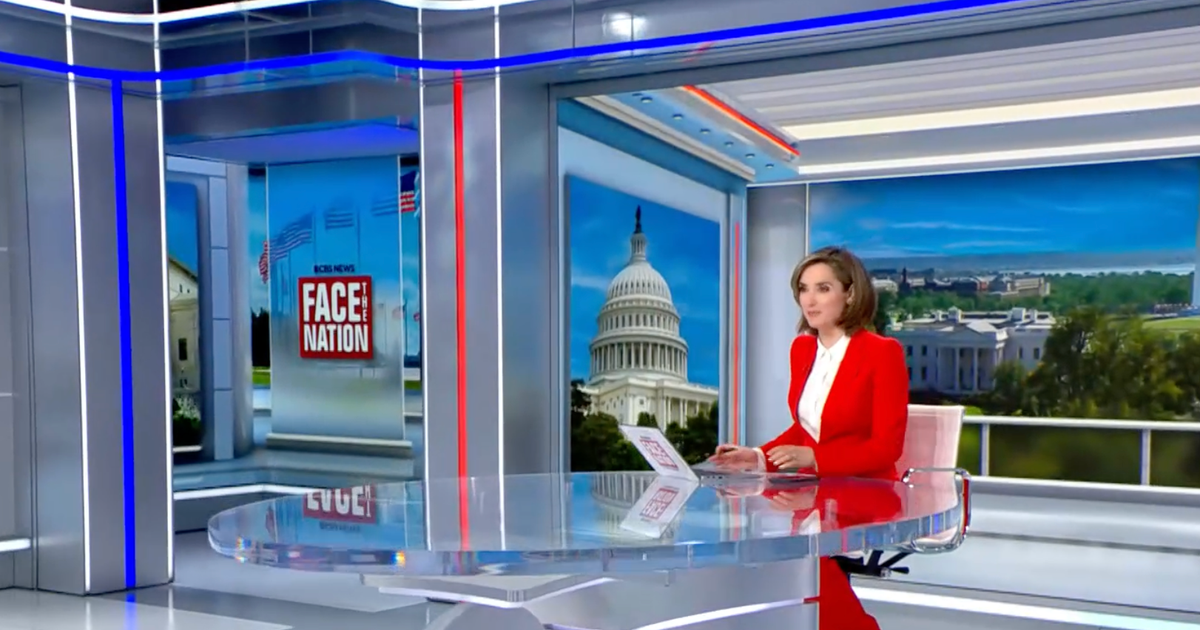Transcript: Andrew Boyd and Mouaz Moustafa on "Face the Nation with Margaret Brennan," Dec. 8, 2024
The following is a transcript of an interview with Mouaz Moustafa, executive director for the Syrian Emergency Task Force, and Andrew Boyd, former director of the CIA's Center for Cyber Intelligence, on "Face the Nation with Margaret Brennan" that aired on Dec. 8, 2024.
MARGARET BRENNAN: For some analysis on the events unfolding in the Middle East, we're joined now by Andrew Boyd, a CBS News contributor who previously held leadership positions at the CIA and once served in Damascus as a Foreign Service Officer, and Mouaz Moustafa, the Executive Director of the Syrian Emergency Task Force. Welcome back to "Face the Nation." Mouaz, I want to start with you. You've been involved with the Syrian opposition for well over a decade. Help us understand what it means to see the regime fall.
MOUAZ MOUSTAFA, EXECUTIVE DIRECTOR FOR THE SYRIAN EMERGENCY TASK FORCE: It's an indescribable feeling of- of happiness that- that this regime, this dictator who has made the worst crimes of the 21st century, alongside Russia, and Iran, and ISIS, all of these horrible people have been defeated by a coalition of rebel forces that did not need any support from any outside country, not Turkey, not Qatar, not anyone. This time around, Syria was liberated by its people, for its people. And it's truly inspiring. And it's not just good reverberations for Syria, for the Middle East and Europe as well.
MARGARET BRENNAN: There's a lot of uncertainty as to what this all means. Andy, you've watched this region very closely for some time. At this hour, none of the officials that I have spoken with in regional governments, in the U.S. government, seem to know where Bashar al-Assad even went. Does it matter where he went?
ANDREW BOYD, FMR. CIA CENTER FOR CYBER INTELLIGENCE DIRECTOR: Mouaz may differ on this one. I don't think it does, now that the government has fallen. I do think what unfolds over the next couple of weeks, and- and if the opposition actually treats all of the factions in Syria with dignity and respect and- and ensures their safety, we will have more understanding, because you know, there's a lot of atrocities that were carried out by the Assad regime. Those people are probably still in Syria, and so we'll see how that goes.
MARGARET BRENNAN: A fair point, the people who worked within the regime are still there.
BOYD: Syrian military intelligence, the mil- the other intelligence services, Syrian General Intelligence Directorate, I mean, have- have a lot of blood on their hands.
MARGARET BRENNAN: Yes, and I know that you personally, Mouaz, were involved in smuggling out documented evidence of some of the torture, of the mass atrocities, the systematic, institutionalized violence that happened from some of those prisons. You brought it to Congress. You made it public. What do you think we can learn now, as those billing- buildings are being seized by rebels?
MOUSTAFA: Well, the first thing that we are working really hard, and I can tell you all the rebel factions are working really hard to do, is find Austin Tice and hopefully bring him home, God willing, alive, to his family—
MARGARET BRENNAN: An American journalist who once worked at CBS News for some time, a Marine veteran.
MOUSTAFA: And he's a hero. He went to cover the plight of the Syrian people from what Assad, Iran, and Russia have been doing to them, and God willing, we bring him home alive, but we need to find him and bring him to his mom no- no matter what. And the Syrians owe him a debt forever. Also, other Americans that are undeclared. And freeing Syrians from- from prisons is something that's really important, but the collection of that intelligence as well as the Hezbollah, Iranian, Russian, Assad regime, any officials that have been arrested by the Syrian people, again, without any support of the international community or regional countries, who actually worked to try to save Assad, that is valuable, that's valuable to the United States. That's why we need to engage with this new, emerging government that God willing, is the path to democracy. The only Arab country in the world with the hope of being a democracy is Syria. That's incredible.
MARGARET BRENNAN: That- that's a big promise to make.
MOUSTAFA: It's not a promise, it's hope, that's realistic.
MARGARET BRENNAN: Hope. Andy- but right now, the person we're seeing emerge—we showed him, in Umayyad Mosque, hugely symbolic place to come and make a speech, in Damascus—is this leader of a terrorist group, designated by the United States as a terrorist, $10 million bounty on his head.
BOYD: Correct.
MARGARET BRENNAN: What does that signify to you?
BOYD: Well, as Congressman Turner said, it's not going to be an easy process to un-designate Abu Muhammad al-Jawlani—
MARGARET BRENNAN: Which means the U.S. can't talk to him.
BOYD: The U.S. can't talk to him. I mean, you know, we can accommodate some sort of flexibility there, but he's not going to instantly come off the designation list. So, I mean, we'll see. I mean, you have said that- that he's going to respect all the factions, the Druze, the Christian, even the Shia and Alawi, who were responsible for the deaths of hundreds of 1000s of Syrians—
MOUSTAFA: I'm speaking by his actions, not by his words. Aleppo, et cetera. You could talk to the Bishop of Aleppo, but, yeah, absolutely.
BOYD: Right, but, you know, time will tell. I mean, I'm a born skeptic, as a lot of my colleagues at the agency are. We will see.
MARGARET BRENNAN: Go ahead, Mouaz. Tell us who is in this- you talked about it as a coalition, not just HTS. Who are these people who now seem to be in control of Syria?
MOUSTAFA: Sure. First of all, since the whole world is boiling down the whole Syrian revolution to one faction of a coalition, or let's say, even one person within a faction of that coalition, let's discuss that. Why was HTS put on the terrorist list? It was put on a terrorist list over an older version called Jabhat al-Nusra that had a loose affiliation with al-Qaeda, not the transnational or regional terrorist thing, but an inter-Islamist, whatever. I don't agree with any—
BOYD: But- but Mouaz, I think Margaret's talking also as a person Abu Muhammad al-Jawlani. I mean, he was in al-Qaeda in Iraq. He worked for Abu Musab Zarqawi. He spent several years in Bucca prison as a detainee, you know, so, we're also, we're talking HTS, Jabhat al-Nusra, but also him as a person. He's designated—
MOUSTAFA: Sure, let's talk about him as a person. But what's hilarious about this is, right now, as millions of Syrians come back from Europe and are ready to come back home, as people have not been displaced, and there has been zero reports of violations, and I was on the phone with the Bishop of Aleppo. The reason I was on the phone is that President Trump, and people in President Trump's camp were concerned about the Christians in Syria. Of course, there's so much focus on, you know, any time there's something- terrorists, terrorists. And- and what ended up happening is the Bishop of Aleppo said, Sir, first, it's the coalition of groups, including HTS, and we have had electricity more now than we have under the regime, and our only fear is Russian air strikes. So I'm glad that President Trump still- told Russia what it should do: get out of Syria, and it has done so.
MARGARET BRENNAN: Well, we will be watching to see whether that continues to be the case and what transpires. And what it means for the—
MOUSTAFA: One- one last thing, Margaret, it's really important—
MARGARET BRENNAN: Mouaz, I have to go. I'm so sorry.
MOUSTAFA: But al-Qaeda in Syria [UNINTEL], it's the affiliate, and HTS has defeated it and defeated ISIS. The old designation is kind of irrelevant.
MARGARET BRENNAN: Well, we will be watching this developing story, and we'll be right back.


